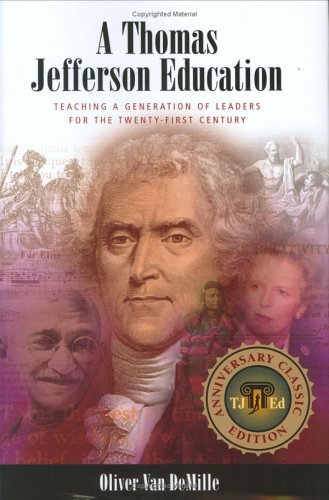Next to my Ph.D. in psychology, this book is most responsible for my fascination with how to motivate children to learn. Although certainly not the first voice in asserting that our educational system is broken, nor the first to argue that a classical education is superior, Oliver Van DeMille may be the most influential in insisting that “all education is self-education.”
The most powerful point Mr. DeMille makes is that teaching a child or requiring a child to do lessons that he is not motivated to learn is an exercise in futility. While a student who is mandated to memorize something for a test may be able to give the correct answers when called upon to do so, this student hasn’t really been educated.
If Mr. DeMille is correct, the question then becomes, how can we motivate children to want to learn something for themselves? After all, we worry that our children may never want to learn math as much as they want to learn computer skills, for example. Some of the follow-up books to a TJEd give examples of how to motivate. A mother who wanted her children to learn to ice skate did not just sign them up for lessons as most of us parents are wont to do. Instead, she took them to watch figure skaters several times until the children begged for lessons. The lesson for us as home educators may be that we are trying to feed students who aren’t hungry.
My desire is to have students hungry to learn everything they need to know to fulfill the purposes God has for them. Many homeschoolers are quite interested in the TJEd philosophy and how they might implement it. Here is what it looks like in my home:
- Emphasis on classic literature. I agree with Mr. DeMille that classics do more than just develop vocabulary; they can develop character, particularly if they are discussed in reference to a biblical worldview.
- Permission for older students to choose their curriculum and study full-time. My oldest son is a perfect example of a student who studies for hours without requiring external motivation. He chooses his subjects and masters them, coming out of his office to share what he’s learning with his dad and me. My oldest is definitely a self-directed leader. However, I think what TJEd doesn’t address is the personality differences that may prohibit this learning style from working with every student. My second oldest desires lots of structure rather than freedom, for example.
- Parent education. TJEd suggests that parents study voraciously with a mentor while their children are doing so. While this kind of time commitment would never work for me as a mother of six (nor do I agree that it’s necessary), I have made a commitment to read more classic books along with my children so we can discuss them.
- Emphasis on internal motivation. I don’t believe that finding ways to motivate your child means that you have to make everything fun. Some children aren’t as motivated by fun as they are by appreciation, money, or meeting goals. I find it fun, however, to discover what will get each child busy learning. I look forward to sharing many of my discoveries with you here in the future.
- Supplementing with early requirements. TJEd like Unschooling in the extreme has nothing to do with workbooks or learning material that the child has no interest in. I, like most homeschoolers, feel uncomfortable with the exclusion of some required learning. I recently read something in our piano curriculum that resolved the tension for me. The author argued that we ought to require our children to learn the basics as children so that the tools are there when their internal motivation takes over. I had my oldest child take piano lessons for several years. He told me he wanted to quit and I had no problem letting him do so. I had asked for the same privilege from my mother as a child. A couple of years later, he became completely enamored with classical music. He told me he wanted to begin taking lessons again. As we tried to arrange that, he began practicing on his own. For hours. He became so skilled at playing that he quit asking about hiring an instructor. Had I not ensured that he had the basic capacity to play as a young child, he would not have been able to fulfill the passion for piano that he has today.
I highly recommend you give a TJEd a read. Even if you do not adopt the entire philosophy, I believe you will come away from reading feeling motivated to continue educating your children at home.







